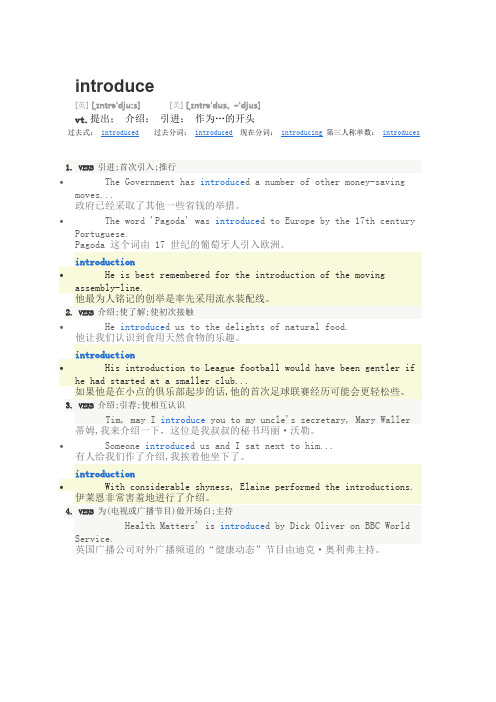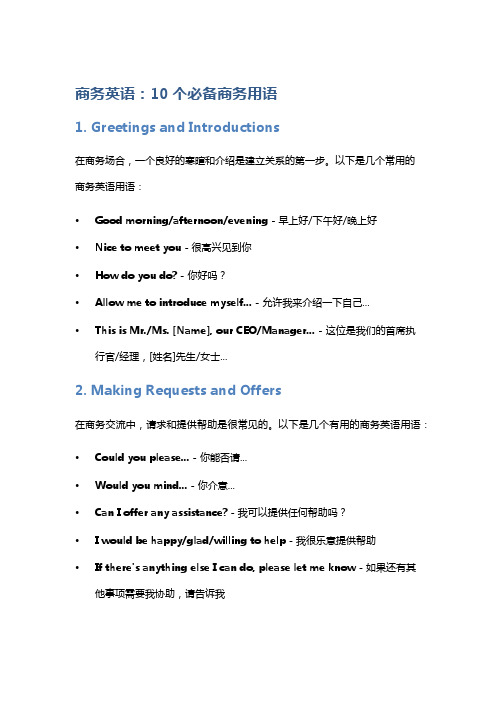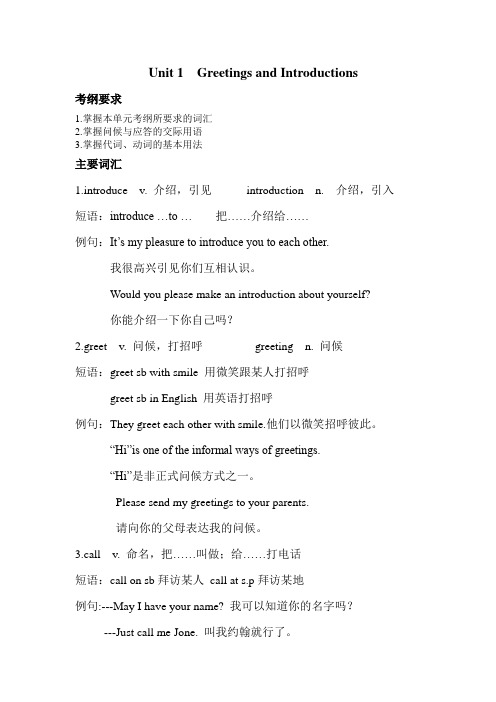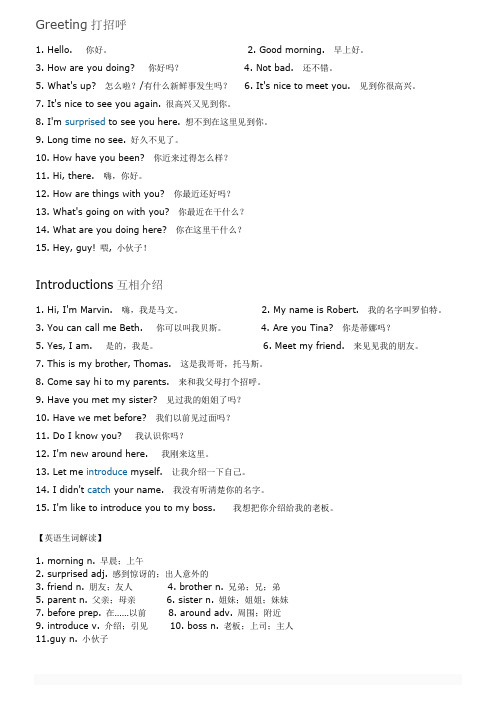introductions
introduce用法

introduce[英] [ˌɪntrəˈdju:s][美] [ˌɪntrəˈdus,-ˈdjus]vt.提出;介绍;引进;作为…的开头过去式:introduced过去分词:introduced现在分词:introducing第三人称单数:introduces1.VERB 引进;首次引入;推行∙The Government has introduce d a number of other money-saving moves...政府已经采取了其他一些省钱的举措。
∙The word 'Pagoda' was introduce d to Europe by the 17th century Portuguese.Pagoda 这个词由 17 世纪的葡萄牙人引入欧洲。
introduction∙He is best remembered for the introduction of the moving assembly-line.他最为人铭记的创举是率先采用流水装配线。
2.VERB 介绍;使了解;使初次接触∙He introduce d us to the delights of natural food.他让我们认识到食用天然食物的乐趣。
introduction∙His introduction to League football would have been gentler if he had started at a smaller club...如果他是在小点的俱乐部起步的话,他的首次足球联赛经历可能会更轻松些。
3.VERB 介绍;引荐;使相互认识Tim, may I introduce you to my uncle's secretary, Mary Waller 蒂姆,我来介绍一下,这位是我叔叔的秘书玛丽·沃勒。
∙Someone introduce d us and I sat next to him...有人给我们作了介绍,我挨着他坐下了。
介绍;指南;手册的英文

介绍;指南;手册的英文In the world of communication, introductions, guides, and manuals play a pivotal role in conveying information and ensuring clarity. They are the first points of contact for readers, whether they are new to a subject or seeking clarification on a specific aspect. When it comes to the English language, mastering the art of writing these types of documents is crucial for effective communication.**Introductions**An introduction is often the first impression you make on your reader. It should be concise, informative, and engaging. The goal is to capture the reader's interest and provide a clear overview of what the document will cover. When writing an introduction in English, it's important to use active voice, avoid jargon or technical language, and keep the tone friendly and inviting.Here's an example of a well-constructed English introduction:"Welcome to this comprehensive guide on the basics of cooking Italian cuisine. In this document, we will explorethe essential ingredients, techniques, and recipes that form the backbone of Italian cooking. Whether you're a beginner or an experienced chef, you'll find useful tips and insights that will enhance your cooking skills. Let's dive in and discover the delicious world of Italian cuisine together!"**Guides**Guides are similar to introductions but tend to be more detailed and focused on specific topics or tasks. They aim to provide step-by-step instructions or explanations to help readers achieve a particular goal or understand a complex concept. When writing a guide in English, it's essential to use clear and concise language, avoid assumptions, and provide ample examples and illustrations. Here's an example of an English guide on how to make coffee:"Making coffee at home can be a rewarding experience, but it's important to follow the right steps to ensure a delicious cup. In this guide, we'll walk you through the basics of making coffee using an espresso machine. First, we'll discuss the different types of coffee beans and theirunique flavors. Then, we'll provide step-by-step instructions on how to grind the beans, tamp them into the portafilter, and extract the espresso. Finally, we'll offer tips on how to steam milk and create delicious coffee drinks like cappuccinos and lattes. Let's get started on your journey to becoming a coffee expert!"**Manuals**Manuals are typically thicker and more comprehensive documents that provide detailed instructions and information on how to use a product or perform a task. They are often used for technical products or processes and require a high level of accuracy and detail. When writing a manual in English, it's crucial to use a consistent style and tone, include detailed illustrations and screenshots, and provide clear, step-by-step instructions.Here's an example of an English manual for setting up a home wireless network:"Setting up a home wireless network can be a challenging task, but with this manual, you'll have the tools and knowledge to get the job done. In this guide,we'll cover everything from choosing the right equipment toconfiguring your router and connecting devices. We'll provide detailed instructions on how to set up a secure network, troubleshoot common issues, and optimize your network for the best performance. Whether you're a tech-savvy individual or a beginner, this manual will provide you with the information you need to set up and maintain a reliable home wireless network."Writing introductions, guides, and manuals in English requires a balance of clarity, detail, and engagement. By using active voice, avoiding jargon, and providing ample examples and illustrations, you can create documents that are both informative and enjoyable to read. With practice and attention to detail, you can master the art of writing these types of documents and effectively communicate your ideas and information to a wide audience.。
【单元测】 三年级英语上册Module 2 Introductions 教科版(广州)含答案

单元测试卷三年级英语上册Module 2 Introductions教科版(广州)含答案一、选出不同类的单词。
(10分)()1.A. am B. you C.is()2. A. Ms B.good C. fine()3. A. my B. your C. show()4. A. mum B. grandma C. dad()5. A. evening B. afternoon C. hello二、选择相应的短语连线。
(12分)()1.Wash your hands A.洗脸()2.Brush your teeth B.洗手()3.Wash your face C. 刷牙()4.clean your ears D. 洗脚()5.Clean your feet E.摸摸你的眼睛()6.Touch your eyes F. 清洁耳朵()7.Touch your nose G. 洗头()8.Wash your hair. H.摸摸你的鼻子三、单项选择。
(20分)()1. The Bird’s Nest is in_________A.ShanghaiB. BeijingC.Hong Kong()2.What’s______name?A.yourB. youC.I()3.In the ______,we ask “Where’s the restroom?”A.UNB. UK()4.—How are you? —_________A.Nice to meet you.B. I’m fine,thanks.C. And you?()5. —Can you play ball games______? —Yes,I can.A.goodB. niceC. well()6. —______—My name is Yang yang.A.What’s your name?B. How are you?C.Hello!()7. I’m fine,thank you._____how are you?A.AndB.andC./()8. We must write on_____of the paper.A.one sidesB. both sidesC. both piece()9. I go to school on______.A.MondayB. SundayC. Saturday()10. Don’t ______ late next time!A.areB. beC.is四、为下列句子选择对应的图片。
英语情景交际常用语

- Is there a restroom nearby? 附近有洗手间吗? - Can you recommend a good hotel in this area? 你能推荐这个地区的好酒店吗?
6. 社交场合(Socializing): - What do you do for a living? 你的职业是什么? - How was your weekend? 你的周末过得怎么样? - Would you like to grab a coffee sometime? 有时间一起喝杯咖啡吗? - It was nice meeting you. 很高兴认识你。 这些常用语可以帮助你在不同情景下进行基本的交流和沟通。记得多练习,提高口语表达 能力。
5. 旅行(Traveling): - Excuse me, where is the nearest bus station? 对不起,请问最近的公交车站在哪里 ? - How much is a ticket to [destinationபைடு நூலகம்? 去[destination]的票价是多少?
英语情景交际常用语
英语情景交际常用语
以下是一些常见的英语情景交际常用语:
1. 问候与介绍(Greetings and Introductions): - Hello! / Hi! 你好! - How are you? 你好吗? - Nice to meet you. 很高兴见到你。 - What's your name? 你叫什么名字? - My name is [name]. 我叫[name]。 - Where are you from? 你来自哪里?
英语作文写作之introductions开头介绍

Bookstore shelves today are crammed with dozens of different diet books. The American public seems willing to try any sort of diet, especially the ones promising instant, miraculous results. Diet book authors are more than willing to invent new fad diets to cash in on this craze. Unfortunately some of these fad diets are ineffective or even unsafe. One of the worst fad diets is the “Palm Beach” plan. It is impractical, does not achieve the results it claims and is a sure route to poor nutrition.
Methods of introducing your thesis
Start with an idea that is opposite of the one you will develop.
When I decided to return to school at age thirty five, I wasn’t at all worried about my ability to do the work. After all, I was a grown woman who had raised a family, not a confused teenager fresh out of high school. When I started classes, I realized those “confused teenagers” sitting around me were in much better shape for college than I was. They still had all their classroom skills in bright, shiny condition, while mine had grown rusty from disuse. I had to learn how to locate information, how to write a report, and how to speak up in class discussions.
学习英语的基本对话:英语知识点

学习英语的基本对话:英语知识点英语对话是提高英语口语能力的重要手段之一,掌握一些基本的英语对话表达可以帮助我们更好地进行日常交流。
本文将介绍一些常用的英语知识点,并以对话形式呈现,以帮助读者更好地理解和记忆。
1. 问候与介绍 Greetings and IntroductionsA: Hi, how are you?B: I'm good, thank you. And you?A: I'm fine, thanks. By the way, let me introduce myself. I'm Alice.B: Nice to meet you, Alice. I'm Peter.在这个对话中,A向B问好并进行自我介绍,而B也回应了问候并进行了自我介绍。
问候和自我介绍是我们日常生活中最基本的交际方式之一。
2. 打电话 Making a Phone CallA: Hello, may I speak to John?B: I'm sorry, he's not in at the moment. Can I take a message?A: Sure, could you please let him know that I called? It's urgent.B: Of course, I'll make sure he gets the message.在这个对话中,A想给John打电话,但是对方告诉他John不在,A 请求对方转达消息。
这是一个典型的打电话对话,我们在生活中经常会遇到。
3. 应约与取消约会 Making and Canceling AppointmentsA: Hi, are you free tomorrow evening?B: Yes, I'm available. What's up?A: Let's have dinner together. How about 7 o'clock at the Italian restaurant?B: Sounds good. See you tomorrow!A: Hi, I'm sorry I can't make it tomorrow. Can we reschedule?B: No problem, when are you available?A: How about next Monday?B: That works for me. See you then!这个对话中,A邀请B一起吃饭,并商定了时间和地点。
introductions是什么意思

introductions是什么意思
introductions是英语名词introduction的复数,它的意思是初次投入使用,采用,引进,推行;新采用或新引进的事物;介绍,引见。
扩展资料
例句:
1、The notes are intended as an introduction to the course.
这些笔记的目的是作为对这门课程的`介绍。
2、Our speaker today needs no introduction.
我们今天的发言人就不必介绍了。
3、 It's a useful introduction to an extremely complex subject.
这是对一门极为复杂的学科的有益入门教程。
4、This album was my first introduction to modern jazz.
这张专辑唱片让我初次接触了现代爵士乐。
5、The book lists plants suitable for the British flower garden, among them many new introductions.
这本书列出了适合英国花园种植的花草,其中有很多新引进的品种。
商务英语:10个必备商务用语

商务英语:10个必备商务用语1. Greetings and Introductions在商务场合,一个良好的寒暄和介绍是建立关系的第一步。
以下是几个常用的商务英语用语:•Good morning/afternoon/evening - 早上好/下午好/晚上好•Nice to meet you - 很高兴见到你•How do you do? - 你好吗?•Allow me to introduce myself... - 允许我来介绍一下自己...•This is Mr./Ms. [Name], our CEO/Manager... - 这位是我们的首席执行官/经理,[姓名]先生/女士...2. Making Requests and Offers在商务交流中,请求和提供帮助是很常见的。
以下是几个有用的商务英语用语:•Could you please... - 你能否请...•Would you mind... - 你介意...•Can I offer any assistance? - 我可以提供任何帮助吗?•I would be happy/glad/willing to help - 我很乐意提供帮助•If there's anything else I can do, please let me know - 如果还有其他事项需要我协助,请告诉我安排会议时,需要使用适当的商务用语来表达你的意图和计划。
以下是几个常见的商务英语用语:•I'd like to arrange a meeting - 我想安排一次会议•Could we schedule a meeting for [date/time]? - 我们能否安排在[日期/时间]开会?•Can you please check your availability? - 请您确认您的时间是否方便?•Let's meet at [location] - 让我们在[地点]见面•Would it be possible to reschedule the meeting? - 是否可以重新安排会议?4. Making Invitations在商务场合,邀请某人出席活动或参加会议是很常见的。
greetings_and_introductions1

2
>>
3
>>
4
>>
Greetings and introductions
• 反义疑问句 • I'm engaged at the moment. Don't come to interrupt me again, ? A. can you B. do you C. am I not D. am I • will you 也可以,表示请求
• 愤怒的喊声传入我们耳中。
• Shouts of anger greeted our ears.
>> 0 >> 1 >> 2 >> 3 >> 4 >>
Greetings and introductions
• • • • • Greeting n. 问候,招呼 她微笑着打招呼。 She smiled in greeting. [U] 她兴高采烈地打招呼欢迎我们。 She welcomed us with a cheerful greeting.[C]
>>
0
>>
1
>>
2
>>
3
>>
4
>>
Greetings and introductions
• acquaintance n. 熟悉;熟人 • have acquaintance with • 她懂一点法语。 She has some acquaintance with French.
>>
0
>>
1
>>
高级英语口语900句

高级英语口语900句1. Greetings- Good morning! / Good afternoon! / Good evening! - How are you?- Nice to meet you.- How have you been?- Long time no see!2. Introductions- My name is {your name}.- I'm from {your country}.3. Making Requests- Could you help me with something?- Can you do me a favor?- Would it be possible for you to...?- I would appreciate it if you could...- Is there any chance you could...?4. Giving Directions- Go straight ahead.- Turn left/right.- It's on your left/right.- It's just around the corner.- You can't miss it.5. Asking for Permission- Do you mind if I...?- Is it okay if I...?- Would you be okay with me...?- Can I...?- May I...?6. Apologies- I'm sorry for...- My apologies for...- I apologize for...- Please accept my sincere apologies for... - I'm really sorry about...7. Expressing Thanks- Thank you!- Thanks a lot.- I really appreciate it.- You're so kind.- I can't thank you enough.8. Making Suggestions- How about...?- Why don't we...?- Have you considered...?- Maybe we could...?- What if we...?9. Agreeing and Disagreeing - I agree.- I think so too.- That's right.- I'm afraid I can't agree.- I disagree.10. Making Plans- Let's meet up.- What do you think about going to...? - We should definitely...- How about we...?- I'm free on...11. Asking for Opinions- What do you think?- What's your opinion?- How do you feel about...?- What are your thoughts on...?- Do you agree or disagree?12. Expressing Preferences- I prefer...- I would rather...- I like... more than...- I'm partial to...- I'm more into...13. Expressing Emotions - I'm thrilled.- I'm delighted.- I'm ecstatic.- I'm furious.- I'm devastated.- This is better than...- It's worse than...- It's similar to...- It's different from...- It's as good as...15. Describing People- He/She is tall/short/fat/thin. - He/She has long/short hair. - He/She has blue/brown eyes.- He/She has a big smile.- He/She is very friendly.16. Describing Places- It's beautiful.- It's peaceful.- It's crowded.- It's noisy.- It's picturesque.17. Describing Things- It's small/big.- It's expensive/cheap.- It's old/new.- It's heavy/light.- It's useful/useless.18. Expressing Agreement - I agree with you.- That's exactly what I think.- Absolutely!- I couldn't have said it better myself.- You're right.19. Expressing Disagreement- I'm sorry, but I don't agree.- I see things differently.- I'm afraid I can't agree with you.- I'm not so sure about that.- I respectfully disagree.20. Expressing Possibility- It's possible.- It's likely.- It could happen.- There's a chance.- It's within the realm of possibility.以上是共900句高级英语口语的简要总结。
中职英语第一册Unit 1 Greetings and Introductions知识复习

Unit 1 Greetings and Introductions考纲要求1.掌握本单元考纲所要求的词汇2.掌握问候与应答的交际用语3.掌握代词、动词的基本用法主要词汇1.introduce v. 介绍,引见introduction n. 介绍,引入短语:introduce …to … 把……介绍给……例句:It’s my pleasure to introduce you to each other.我很高兴引见你们互相认识。
Would you please make an introduction about yourself?你能介绍一下你自己吗?2.greet v. 问候,打招呼greeting n. 问候短语:greet sb with smile 用微笑跟某人打招呼greet sb in English 用英语打招呼例句:They greet each other with smile.他们以微笑招呼彼此。
“Hi”is one of the informal ways of greetings.“Hi”是非正式问候方式之一。
Please send my greetings to your parents.请向你的父母表达我的问候。
3.call v. 命名,把……叫做;给……打电话短语:call on sb拜访某人call at s.p拜访某地例句:---May I have your name? 我可以知道你的名字吗?---Just call me Jone. 叫我约翰就行了。
Yesterday I called on my uncle/called at my uncle’s.昨天我拜访了我的叔叔。
4.vocational adj. 职业的vocation n. 职业短语:vocational school 职业学校vocational education 职业教育例句:I’ m studying in a vocational school of Qingdao.我在青岛的一所职业学校学习。
unit_1_Greetings_and_Introductions

interesting也是形容词,意为“令人感兴趣的”, 既可以作表语,也可以作定语。 如: The story is very interesting. 这个故事很 有趣。
spell v.
Do you know how to spell the word ? The spelling of the word is g-r-e-e-t.
How are you? Hello/Hi! Nice/Pleased/Glad to meet you. How are you doing?
How is everything/life/ your vocation/holiday/weekend?
How do you do?
More practice
call v. 把…叫做
You can call me Miss zhang.
Miss. 小姐,中小学女教师 Mrs. 夫人, 太太 Mr. 先生
○He
often calls on me. called at Mr. Jame‟s this afternoon.
call on sb. call at a place
Good morning ! I am from Rizhao.
I am a worker. What do you do? I work on a farm.
Task 3 Questions and answers 问答练习
1、Formal 正式场合的打招呼和介绍 正式 How do you do ? My name is…. Pleased/ Glad to meet you. 回应 How do you do? I‟m…. Pleased/ Glad to meet you, too.
英语介绍指南手册

英语介绍指南手册Have you ever found yourself in a situation where you needed to introduce someone in English, but didn't know how to do it effectively? 你是否曾经发现自己处在需要用英语介绍某人的情况下,但却不知道如何有效地做呢?Introduction is a crucial skill that can have a significant impact on the way people perceive you and the person you are introducing. 介绍是一项关键技能,它会对人们如何看待你和你要介绍的人产生重大影响。
To help you navigate through the complexities of English introductions, we have put together a comprehensive guide that covers everything you need to know. 为了帮助你更好地应对英语介绍中的复杂情况,我们整理了一份涵盖了你需要了解的所有内容的全面指南。
First and foremost, it's important to understand the purpose of the introduction. In many cases, introductions serve as a way to establish connections and create a positive first impression. 首先,了解介绍的目的是非常重要的。
在许多情况下,介绍是建立关系和产生积极第一印象的一种方式。
When introducing someone in English, it's essential to start with a warm greeting and a brief explanation of why the introduction is taking place. 在用英语介绍某人时,重要的是要以热情的问候开始,并简要解释介绍发生的原因。
Greeting and introductions 打招呼和互相介绍

Greeting打招呼1. Hello. 你好。
2. Good morning. 早上好。
3. How are you doing? 你好吗?4. Not bad. 还不错。
5. What's up? 怎么啦?/有什么新鲜事发生吗?6. It's nice to meet you. 见到你很高兴。
7. It's nice to see you again. 很高兴又见到你。
8. I'm surprised to see you here. 想不到在这里见到你。
9. Long time no see. 好久不见了。
10. How have you been? 你近来过得怎么样?11. Hi, there. 嗨,你好。
12. How are things with you? 你最近还好吗?13. What's going on with you? 你最近在干什么?14. What are you doing here? 你在这里干什么?15. Hey, guy! 喂, 小伙子!Introductions互相介绍1. Hi, I'm Marvin. 嗨,我是马文。
2. My name is Robert. 我的名字叫罗伯特。
3. You can call me Beth. 你可以叫我贝斯。
4. Are you Tina? 你是蒂娜吗?5. Yes, I am. 是的,我是。
6. Meet my friend. 来见见我的朋友。
7. This is my brother, Thomas. 这是我哥哥,托马斯。
8. Come say hi to my parents. 来和我父母打个招呼。
9. Have you met my sister? 见过我的姐姐了吗?10. Have we met before? 我们以前见过面吗?11. Do I know you? 我认识你吗?12. I'm new around here. 我刚来这里。
英语作文写作之Introductions开头介绍

Introducing Your Thesis
Begin with a broad general statement, then narrow into your thesis.
Bookstore shelves today are crammed with dozens of different diet books. The American public seems willing to try any sort of diet, especially the ones promising instant, miraculous results. Diet book authors are more than willing to invent new fad diets to cash in on this craze. Unfortunately some of these fad diets are ineffective or even unsafe. One of the worst fad diets is the “Palm Beach” plan. It is impractical, does not achieve the results it claims and is a sure route to poor nutrition.
Attract readers interest Supply any background info reader may require Present thesis statement- clear, direct statement of the main idea. Plan of development
Summery: Ways to Introduce Thesis
商务英语-入门篇

倾听完讲解,题目能作对吗,试试看吧! 倾听完讲解,题目能作对吗,试试看吧! 1.Peter: Harvey, I don't know ___ here. You'll have to ___ me? Harvey: Of ___ , I'll introduce you to Sarah. She's an old friend of Mine. Sarah, this is Peter. He's just ___ the company. Sarah: ___ to meet you, Peter. Where do you come from? 2. Klaus Ficher: ___ do you do? My name is Klaus fischer. American: Nice to meet you. ___ is Brenda Cole.
2.展示自我 2.展示自我
preparation 预习 课 ,您学会 给对 . 仅仅 这 ,还 够 .您还 Presenting Yourself J…‰V 进 ,让对 , 时 对 .这 课, 们 将讲 巧, 介绍 介词 巧, 介绍 从 业,工 单 门. 学习 过 , 介词 课 ,这可 . , 让 们 来看看 课 词汇 句 . colleague software development Sales Director the Accounts Department I haven't seen you around before. ' What do you பைடு நூலகம்o (for a living)? I work for Manders. I work at Manders. I'm in computers. I'm on the market research side. ' I'm on the Sales Department. ' 软件开发 销 会计 这儿没见过你. V‰KL‰ 这儿没见过你. 你 为 V V 么工 (谋 )? 公 工 . 管 交 固
日常英语

日常工作用语
Asking for leave
A: Hello, Mr. Compton? This is Susan Miller. B: Hi, Susan. What can I do for you? A: I’d like to take tomorrow off if that’s all right with you. B: Let me see\check. Just a second. There’s no problem, Susan. See you on Wednesday.
A:嗨,简。今天早晨觉得怎么样? B:还好,谢谢。就是有点累。 A:昨晚加班了吗? B:是啊。昨晚两点才回家。
日常工作用语
Work Overtime A: Hi, Jane, how are you doing this morning? B: I’m all right, thanks. Just a little tired. A: You worked overtime last night? B: Yeah, I got home at about 2 o’clock.
冠捷电子(福建)有限公 司
制造部 研发部
5
6
HR
IT
Human Resources Department
Information Techonology Department
人力资源部
资讯信息部
7 8 9 10
QA FA CE LCM
Quality Assurance Department Financial & Accounting Department Construction Engineering Department Liquid Crystal display Module Department
外研社(三起)三年级英语第一册Module2Introductions单元备课教案

外研社(三起)三年级英语第一册 Module 2 Introductions 单元备课教案一、教学内容本节课为外研社(三起)三年级英语第一册 Module 2 Introductions 单元。
教学内容主要包括自我介绍和问候的基本句型,如:“Hello, my name is”, “I'm years old.”等。
同时,学生将学习如何询问他人的名字和年龄,例如:“What's your name?”, “How old are you?”。
课程还包括相关的词汇,如“name”, “age”, “years old”等。
二、教学目标1. 知识与技能:学生能够正确使用自我介绍和问候的基本句型,掌握相关的词汇。
2. 过程与方法:通过小组合作和角色扮演等活动,提高学生的英语听说能力和交际能力。
3. 情感态度价值观:培养学生友好交往的意识,增强学生学习英语的兴趣和自信心。
三、教学难点1. 正确运用句型进行自我介绍和问候。
2. 正确发音和记忆相关词汇。
四、教具学具准备1. 教具:多媒体课件、黑板、录音机等。
2. 学具:英语课本、练习册、彩色笔等。
五、教学过程1. 导入:通过播放英语歌曲或进行简单的英语问候,激发学生的学习兴趣。
2. 新课呈现:通过多媒体课件展示本节课的主要句型和词汇,并进行讲解和示范。
3. 小组活动:学生分组进行角色扮演,练习自我介绍和问候的句型。
4. 巩固练习:通过练习册或黑板上的练习,巩固本节课所学内容。
六、板书设计1. Module 2 Introductions2. 主要句型:Hello, my name is; I'm years old.3. 主要词汇:name, age, years old4. 示例对话:展示一个自我介绍和问候的对话示例。
七、作业设计1.抄写本节课所学的句型和词汇。
2.用英语写一段自我介绍,包括名字和年龄。
3.预习下一节课的内容。
八、课后反思1. 教学过程中,是否充分调动了学生的学习积极性?2. 学生对句型和词汇的掌握程度如何?是否需要进行额外的辅导?3. 教学方法和教学手段是否有效?是否需要调整?4. 学生在小组活动中的参与度如何?是否需要改进小组活动的组织方式?重点关注的细节:教学过程1. 导入环节的设计:导入环节是激发学生学习兴趣的关键。
小学英语精讲精析 Introductions

Module 2 Introductions1.重点词汇:Ms 女士too 也and 那么、和boy 男孩girl 女孩what 什么is 是your 你的name 名字afternoon 下午Mr 先生2.语法句型:当两人初次见面互相询问姓名时,可用What's your name?来提问,回答时,可用My name is ….来回答。
What’s your name? My name is Thomas你叫什么名字?我叫托马斯。
Good morning , boys and girls, I’m Ms Smart. 早上好,孩子们,我是斯玛特夫人。
3.口语交际:Good morning!Good afternoon!Goodbye!/Bye-bye!Unit 1 I’m Ms Smart.1.英语中习惯于把Mr,Miss和Mrs放在人的姓前面,表示一种尊称。
但它们从不单独使用,也不能和名字连用,只能说Mr. Green,而不能说Mr. Jim. Mrs.通常用在已婚女子的丈夫姓前,译为“太太,夫人”。
Miss指未婚女性,称呼婚姻状况不明的女子时,当今英语国家流行用Ms.一词。
由于西方国家的女子不愿让别人知道她们的婚姻状况如何,因而称呼她们一声Ms.她们总是很乐意接受的。
2.介绍自己,比如句型:I’m Tom 我是汤姆。
I’m Ms Smart 我是斯玛特夫人。
3.表示问候的句型:---How are you ?---I’m fine ,thank you.---And how are you ?---I’m fine , too. Thank you4.早晨问候语:---Good morning , boys and girls, I’m Ms Smart.--- Good morning , Ms Smart.早上好,同学们。
此句话应该选()A.Good morning,Ms SmartB.Good morning,boys and girlsC.Hello,I’m Sam【答案】B【解析】同学们可以用boys and girls翻译。
- 1、下载文档前请自行甄别文档内容的完整性,平台不提供额外的编辑、内容补充、找答案等附加服务。
- 2、"仅部分预览"的文档,不可在线预览部分如存在完整性等问题,可反馈申请退款(可完整预览的文档不适用该条件!)。
- 3、如文档侵犯您的权益,请联系客服反馈,我们会尽快为您处理(人工客服工作时间:9:00-18:30)。
Do you love a good fright? Then Halloween is the holiday for you! This eerie festivity is observed in America and Europe on October 31. You can share in the fun by learning some Halloween English lingo and customs. These hair-raising Halloween treats are sure to spook you!你喜欢恐怖吗?那万圣节就是你的节日了!美国和欧洲都视10月31日为阴森的节庆。
你可以通过学习万圣节的英文习语和习俗来分享其中的乐趣。
这些叫人毛骨悚然的万圣节把戏肯定会吓坏你!1. The Halloween celebration comes from All Hallows Day or All Saints Day, the 1st of November. This was originally pagan festival of the dead, but later became a holiday to honor Christian saints。
万圣节的庆祝活动来源于每年11月1日的All Hallows Day 或All SaintsDay。
它原先是异教徒们纪念死者的节日,但是逐渐演变成一个纪念基督圣者的节日。
2. The name Halloween comes from a contraction of All Hallows Eve (Evening),the day before All Hallows Day. On this night it was believed that the spirits of the dead would try to come back to life!Halloween这个词来自于All Hallows Eve(夜晚),All Hallows Eve是All Hallows Day前一天的缩写。
人们认为在当天晚上,亡者的灵魂会重新复活!3. Dressing up in costumes is one of the most popular Halloween customs, especially among children. According to tradition, people would dress up in costumes (wear special clothing, masks or disguises) to frighten the spirits away。
Dressing up incostumes是最受欢迎的万圣节风俗之一,尤其是受孩子们的欢迎。
按照传统习俗,人们会dress up incostumes(穿戴一些特別的服裝,面具或者装饰)来吓跑鬼魂。
4. Popular Halloween costumes include vampires(creatures that drink blood),ghosts (spirits of the dead) and were wolves (people that turn into wolves when the moon is full)。
流行的万圣节服装包括vampires(吸血鬼),ghosts(死者的灵魂)和were wolves(每当月圆时就变成狼形的人)。
5. Trick or Treating is a modern Halloween custom where children go from house to house dressed in costume, asking for treats like candy or toys. If they don't get any treats, they might play a trick (mischief or prank) on the owners of the house。
Trick or Treating是现代万圣节的风俗。
孩子们穿着特殊的衣服走街串巷,讨取糖果和玩具之类的赏赐。
如果他们得不到任何的赏赐,就可能会对屋主大搞恶作剧或者胡闹了。
6. The tradition of the Jack o' Lantern comes from a folk tale about a man named Jack who tricked the devil and had to wander the Earth with a lantern. The Jack o' Lantern is made by placing a candle inside a hollowed-out pumpkin, which is carved to look like a face。
Jack o'Lantern 的传统来自于一个民间传说。
一个名叫Jack的人戏弄了恶魔,之后就不得不提着一盏灯在地球上流浪。
Jack o'Lantern是用雕刻成脸型,中间挖空,再插上蜡烛的南瓜做成的。
One story about Jack, an Irishman, who was not allowed into Heaven because he wasstingy with his money. So he was sent to hell. But down there he played tricks on Devil(Satan),so he was kicked out of Hell and made to walk the earth forever with carrying a lantern.7. There are many other superstitions associated with Halloween. A superstition is an irrational idea, like believing that the number 13 is unlucky!和万圣节有关的迷信还有很多。
迷信是一种不合常理的想法,比如认为13是不吉利的数字!8. Halloween is also associated with super natural creatures like ghosts and vampires. These creatures are not part of the natural world. They don't really exist... or do they?万圣节还和一些诸如鬼魂和吸血鬼之类的超自然的生物有关。
这些生物不是自然界的一部分。
他们实际上是不存在的....。
或许他们其实真的存在?9. Witches are popular Halloween characters that are thought to have magical powers. They usually wear pointed hats and fly around on broomsticks。
女巫是万圣节很受欢迎的人物,人们认为她们具有强大的魔力。
他们通常戴着尖顶的帽子,骑在扫把上飞来飞去。
10. Bad omens are also part of Halloween celebrations. A bad omen is something that is believed to bring bad luck, like black cats, spiders or bats。
恶兆也是万圣节庆祝活动的一部分。
人们相信恶兆会带给坏运气,黑猫、蜘蛛或者蝙蝠都算是恶兆(Greenwich Village Halloween Parade)每年十月三十一日,是西方鬼怪出动的万圣节,据说其由来可追溯到公元前五世纪,当时居住于爱尔兰的凯尔特人(Celtic)将这天定为夏末,亦象征一年的结束,他们相信在新旧岁次交替的前夕,所有时空的规律也会暂时停顿,灵界大门在这晚会打开,令所有鬼魂趁机游走于人间,到处找寻适合的替身,藉此得以重生的机会。
所以,凯尔特人为怕成为鬼魂的目标,便于当晚熄灭家中炉火,装成没有人在家,同时,戴上狰狞可怕的面具,并打扮成鬼怪模样一起走到街上巡游,营造喧哗吵闹的气氛,以驱赶那些游魂野鬼。
纽约市也特别在万圣节晚上举行巡游,让一群吸血鬼,僵尸,巫婆,科学怪人等齐齐现身,还欢迎市民到场参观,到会者不限年龄、性别,不分阶级、国籍,即使你是胆小鬼,也可加入他们的行列,来个热热闹闹的人鬼嘉年华会。
纽约市的万圣节巡游每年都吸引成千上万的纽约人和游客参加,而巡游会在格林威治村﹝Greenwich Village﹞举行,各队伍约在夜晚上七时从第六大道与春天街交界﹝6th Avenue &Spring Street﹞起步,一直游行至第二十三街﹝6th Avenue &23rd Street﹞为止,全程大概个多小时。
附录【幽灵】幽灵的传说遍及全世界,鬼怪的节日自然也少不了它的出现。
【僵尸】一脸煞白或是满面挂彩,僵尸的形象随你想象。
【吸血鬼】优雅、高贵而又冷酷的血族历来都是神秘午夜故事中的常客。
【巫婆】黑猫、扫把、魔法帽……法力无边,但要当心脸上的皱纹哦。
【科学怪人】科幻史上的经典科学怪人,如今也经常现身于万圣节中。
【精灵】每个人心中都有自己的精灵,你想象的精灵是什么模样的?【半人马】半人马的来源在古希腊神话中说法不一,于是半人马也有善与恶。
【狼人】有时是吸血鬼的死敌,有时又传播恐怖与瘟疫。
【魔鬼】我能够满足你的愿望,凡人,但是你要把灵魂抵押给我。
【哥布林】不同的传说与故事中,这些小东西时而邪恶时而滑稽。
【不死鸟】沐浴于阳光,涅盘于火焰,象征着不朽和重生。
【牛头人】克里特岛的牛头怪传说让这种怪物世人皆晓。
【美杜莎】传说中能把人石化的蛇发女妖,曾经美丽堪比雅典娜。
【泰坦】希腊神话中曾统治世界的古老的神族,巨人的代表。
【石像鬼】整日坐在哥特式建筑屋顶上,在望天还是在思考?【蜥蜴人】全身披满厚厚的绿色鳞甲,每只手仅有三个指头。
【木乃伊】化妆好了是木乃伊,COS(扮演)不好就是重病号。
【贝希摩斯】旧约所记载的巨兽,有人认为它是撒旦的化身。
【大脚怪】这种巨型怪兽从未被证实,但传说流传已久。
【巴哈姆特】巴哈姆特的传说代表着阿拉伯人的宇宙观。
